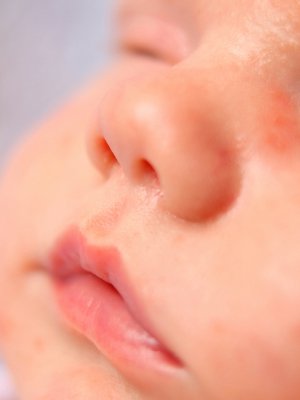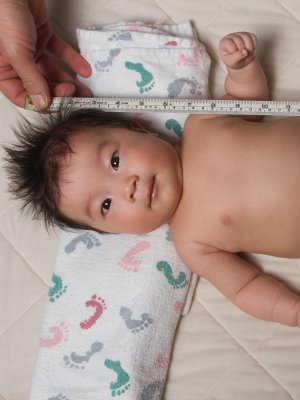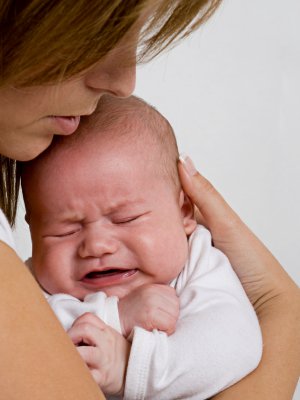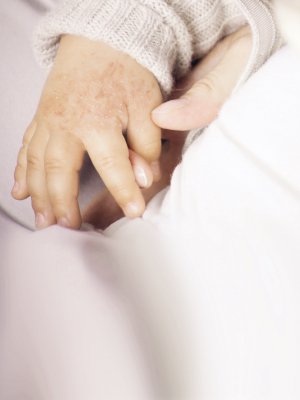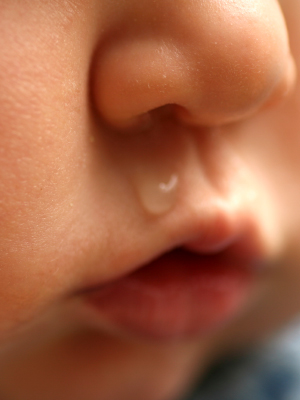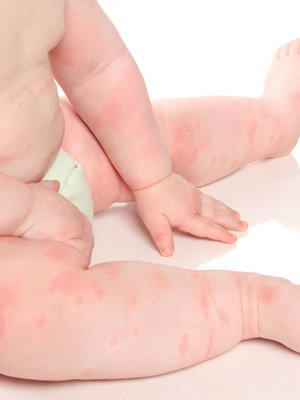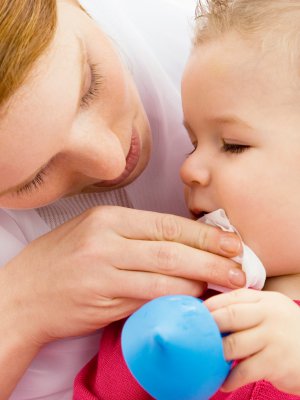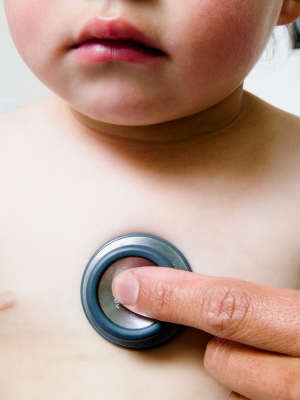RUNNY NOSE

We believe breast milk is the best food for infants. When in consultation with their healthcare professional, mothers and families find that optimal breastfeeding is not possible due to their infant’s medical condition, formulas for special medical purposes play a vital role in providing essential nutrients to infants. We have a global commitment to market breast-milk substitutes responsibly.
Runny nose is the excess drainage of clear fluid or thick mucus produced by nasal and adjacent tissues and blood vessels in the nose.1 Sneezing is the sudden, forceful, uncontrolled burst of air through the nose and mouth caused by irritation to the mucus membranes of the nose or throat.2
What causes runny nose and sneezing in infants?
Both runny nose and sneezing in newborns and infants may be due to infections, such as the common cold or flu, or allergies, such as hay fever or dust allergies.2,3 Both are symptoms of rhinitis, which can have allergic or non-allergic aetiologies.4,5
Runny nose and sneezing as symptoms of Cow’s Milk Protein Allergy
Rhinitis symptoms (including runny nose and sneezing) can also be due to Cow’s Milk Protein Allergy (CMPA). For infants with CMPA, rhinitis symptoms will manifest themselves rapidly following the ingestion of cow’s milk.6
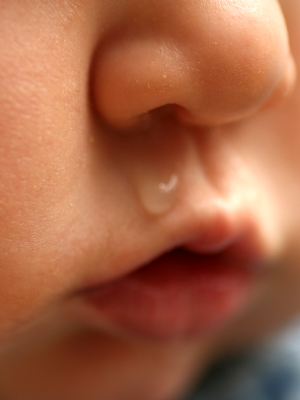
The majority of infants affected with CMPA have at least two symptoms affecting at least two different organ systems.7,8 If, in addition to respiratory symptoms such as runny nose or sneezing, your patient shows any of the signs and symptoms that can be related to CMPA9 (see below), you can use the CoMiSS® tool10 to score the combination of their symptoms and assess the likelihood of CMPA.
Signs and symptoms related to CMPA9
· Gastrointestinal/Digestive: Colic, vomiting, reflux, regurgitation, anorexia, diarrhea, constipation
· Respiratory: Chronic cough, wheezing
· Skin: Atopic dermatitis, urticaria, angioedema
· General: Failure to thrive, anaphylaxis, insomnia, inconsolable crying
How to score this symptom with the CoMiSS® tool
· The combination of respiratory symptoms is given a score
· The higher the score the greater the severity of symptom
· In addition to the respiratory symptoms, if any of the following signs or symptoms related to CMPA are also present, they should also be given a score using the CoMiSS® tool. These include diarrhea, constipation, regurgitation and skin (atopic dermatitis and urticaria) symptoms
CoMiSS® awareness tool
The Cow’s Milk-related Symptom Score (CoMiSS)® is a simple, fast and easy-to-use awareness tool designed to help you more easily recognise the signs and symptoms that can be cow’s milk-related in infants and young children.

If you suspect your patient is suffering from symptoms that may be suggestive of CMPA, use the CoMiSS® tool to score and assess the likelihood of CMPA.
OTHER SYMPTOMS OF COW'S MILK PROTEIN ALLERGY
|
References |
|
1. Mayo Clinic: Runny nose definition. http://www.mayoclinic.org/symptoms/runny-nose/basics/definition/SYM-20050640?p=1 (Accessed March 2016) 2. Medline Plus: Sneezing https://www.nlm.nih.gov/medlineplus/ency/article/003060.htm Accessed March 2016 3. Mayo Clinic: Runny nose causes.http://www.mayoclinic.org/symptoms/runny-nose/basics/causes/sym-20050640(Accessed March 2016) 4. Mayo Clinic: Non-allergic rhinitis. http://www.mayoclinic.org/diseases-conditions/nonallergic-rhinitis/symptoms-causes/dxc-20179169 (Accessed March 2016) 5. Mayo Clinic: Allergic rhinitis. http://www.mayoclinic.org/diseases-conditions/hay-fever/basics/definition/con-20020827 (Accessed March 2016) 6. Caffarelli C., et al. It J Pediatr. 2010;36:5 7. Koletzko S., et al. J Pediatr Gastroenterol Nutr. 2012;55(2):221–9 8. Lifschitz C. and Szajewska H. Eur J Pediatr. 2015;174:141–50 9. Høst A. Pediatr Allergy Immunol. 1994;5:1–36 10. Vandenplas Y., et al. Acta Paed. 2015;104:334–39 |

